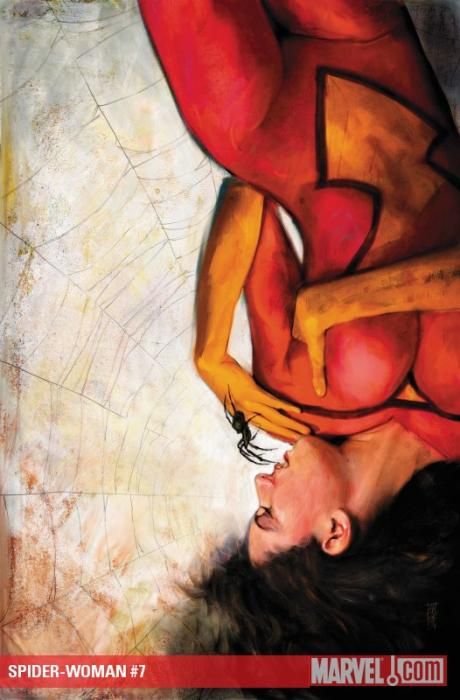So, it turns out that the motion comic killed this series prematurely.
Not because the motion comic was unsuccessful -- it was actually quite popular, even if some critics thought it was a bit of a disaster -- but because Alex Maleev ended up having to do so much work between the motion comic and the regular "Spider-Woman" comic that he burned out on the character. As Brian Michael Bendis explains in the text page at the end of this issue, "these seven issues constituted about 22 issues of work" for Maleev, "in one year's time."
It's not a surprise, then, that this issue is the last of the series. It has been a Bendis and Maleev project from the beginning, and Jessica Drew's sad-sack solo adventures wouldn't be the same without both of them.
This seventh issue is a fine way to end the series, really. It provides some closure for the Jessica Drew-vs.-the-Skrulls plotline, at least to some degreee, and it shows Spider-Woman that she's not alone in the world. She's got friends in high places.
So what this series ultimately accomplished was a kind of cleansing of the character. A superhero catharsis from which Spider-Woman could go off and become a meaningful part of the Marvel mainstream again, without so many questions about how trustworthy she might be after all of her double-dealings and Skrull abduction problems. "Spider-Woman" allowed Bendis and Maleev to tell a good globe-trotting, gal-on-a-mission tale while giving us a sense of who this characters is now, and how she interacts with the world around her.
In this issue, Agent Brand sets Jessica Drew off on another Skrull hunt, but this is the Skrull who attacked Drew back in issue #1 -- so tracking this guy down is a way for Spider-Woman, and Bendis and Maleev, to circle back to the beginning of the series. To close the loop on this chapter of Jessica Drew's life. There's even a callback gag to the opening pages of the first issue, when Drew whines about being the most "screwed-over person" on the planet. In this issue, Wolverine reminds her that he's still the blue ribbon winner in that department.
I've said it before in my previous reviews of this series, but Alex Maleev's art -- now that he's coloring himself -- looks better than ever. This is a stronger look than we saw in his "Daredevil" run, mostly because of his unconventional use of colors, but also because his figures have a charcoal quality that's a bit bolder -- less washed out -- than we saw on his Hell's Kitchen epic. Then again, that washed out quality fit the tone of that series, and this one is a garish disco dance of movement and pain, and the boldness and the color makes it flash like a strobe light.
"Spider-Woman" #7 ends with a validation of the character and her place in the larger superhero universe, and though it may not have been originally planned as the end of her series, it's a fitting one. As she flies up toward the reader in the final double-page spread, she's ready to take on Marvel's new Heroic Age.

